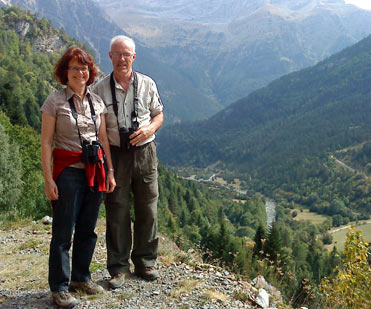Our kind of travellers
Birding In Spain’s Traveller’s Code of Conduct
General guidelines
1. As a nature lover and traveller we believe you should stand up and be noticed. But just make sure it’s for the right reasons…
2.Be sensible with water use, spare it when possible.
3. Accept advice and guidelines on how to minimize your carbon footprint when travelling.
4. Accept that some things are done differently in other places, and try to enjoy the difference.
5. Remember that a smile can go a long way, with very little energy expenditure!
6. Think about how your acts could disturb wildlife, and if and how that disturbance can be avoided.
7. Although not an Encyclopaedia your local guide should be a good source of information about local nature, geography, traditions, etc.
8. Sharing information about sites and species on forums etc. is a free choice, but one which could have negative consequences – the guide’s livelihood, the wildlife and habitat and, in the end, the value of the experience for other people could all suffer.
9. Small rural or family run hotels will notice your passing and usually be grateful for it. City hotels and hotel chains will probably not. If you go where you make a difference and the local people know you go there for nature that in itself will help to create positive attitudes towards the protection of nature.
10. Be aware that not everybody speaks English! Sometimes a few words or phrases in the local language can go a very long way, and the will to communicate even further.
11.Trust in your guide’s judgement about how close to get to wildlife, and what techniques should or shouldn’t be used to enhance your observation experience. One major difference between a guide and a one-time visitor is that the guide expects to return to a site.
12. If possible, look into the possibilities of public transport (bus, train, underground) before jumping into a taxi or going for a rental car.
13. Do not obstruct the daily activities or circulation of local people, or access to fields, homes, etc.
14. What’s the better souvenir, artisan foods or produce bought in a village or town shop where they are produced, or something whipped up at the airport Duty Free?
15.Try to make a difference to conservation. Contribute to a local cause, patronize information centre shops and cafés, stay close to the places you have come to visit.

Notes
What we mean in point 1 here is that we believe nature conservation will reap more benefits if the right people and reasons come under the spotlight of local people’s and regional stakeholders’ gazes. Responsible tourism can sow and reap part of its own harvest, by contributing to the continued existence of what travellers are there to see or to experience.
Responsible tourists and nature travellers can influence their public profile by their own behaviour and choices, which in turn influences the general public’s perception of them and their influence. In most developed countries it is almost impossible for responsible tourism and nature travel to compete on economic impact terms with mass tourism (beach holidays, skiing, etc) but it has many good possibilities to outdo mass tourism on the grounds of perceived costs and benefits to the local inhabitants and small-scale tourist infrastructures.
So for example a respectful foreigner carrying binoculars or a camera who enters a bar to drink a coffee, or a shop to buy some groceries, or who passes through reception at a small rural hotel is someone who stands out from the crowd. And that can be turned to the benefit of nature conservation. They are there to see the birds, to enjoy the natural landscapes, etc. and their presence makes a difference, no matter how small a difference. Perhaps their stay coincides with the tourist low season (as the period immediately after Easter usually is), perhaps local café owners can boast of the people of different nationalities who stop for a drink or a snack in their café; perhaps a farmer can be made to feel proud that his land holds populations of birds which are considered internationally important or attractive. That’s what we mean by being noticed for the right reasons.
Leave a Reply